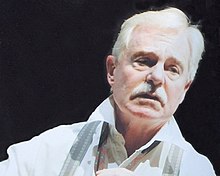The Devil of Christmas
Pemberton intended the episode to be a recreation of this kind of classic programming, with critics characterising it as a homage, pastiche or loving parody.
It shortly becomes apparent, however, that viewers are watching a film, and a director (voiced by Derek Jacobi) provides commentary on the events.
The critical reception of "The Devil of Christmas" was very strong, with praise directed at the writing, acting and production, with some considering it the best episode of Inside No.
The ending, critics noted, was extremely dark; though many offered considerable praise for the final twist, a minority criticised it as gratuitously unpleasant.
Set in December 1977, the film follows Julian, his pregnant wife Kathy, his mother Celia and his son Toby as they are shown into an Austrian Alpine chalet by Klaus.
The new Krampus advances, armed with a machete; the older Dennis explains that "Kathy" understands what is about to happen, and that we are witnessing genuine fear.
[11] The episode was variously described as a recreation[12][13] or re-enactment of this source material,[14] or else as a homage,[15][8] a pastiche[16][17] a "loving, but merciless" parody,[18] or spoof of it.
9's producer, said that "Studio D has the heritage and familiar atmosphere that I remember from when I worked at Elstree in the 1980s; however, a lot of modernisation has taken place since then and this has allowed us to monitor our 4:3 625-line PAL pictures in BBC Studioworks' state of the art HD production gallery.
[29] Other critics did not place it as highly in comparison; Frances Taylor, writing for RadioTimes.com, listed "The Devil of Christmas" as the seventh best of the first 13 episodes.
She described it as a "deliciously dark ... masterclass in the twisted, unsettling stuff that the League of Gentlemen and Psychoville creators do so well",[8] but claimed that "a growing sense of doom" was more prevalent than "belly laughs".
[8] Dessau, too, commented on the lack of humour,[22] while Chris Bennion, writing for the Saturday Review (of The Times) described it as "laugh-out-loud hilarious", while nonetheless "the stuff of nightmares".
[18] For White, much of the episode's strongest humour came from Dennis Fulcher's voice-over;[20] Jackson called this a "pitch-perfect parody of a DVD commentary".
[9] Louisa Mellor, of the entertainment website Den of Geek, explained that "from the aspect ratio to the music, title font, sets, lighting, camera moves, hair, make-up and costume... everything was recognisable from the sort of 1970s television plays that, when you think about it, may have provided inspiration for Inside No.
[17] White, similarly, argued that "it's a gargantuan, incredibly precise task to make such gloriously terrible TV, a skill reserved for only the greatest of comics".
[31] Sarah Hughes, writing in i, compared "The Devil of Christmas" to an episode of Tales of the Unexpected; it was she, argued, "both an immaculately conceived homage to Roald Dahl's original anthology series and a worthy contender for its crown".
[31][8][9][12] Rachel Aroesti, writing for theguardian.com, described the episode as moving "from a twee period piece to what has to be the most depraved half-hour of television ever to grace the festive schedules".
[11] For many critics, the final twist was praiseworthy; it was characterised variously as the episode's "secret weapon",[14] "very fitting",[30] "suitably macabre",[19] and "fantastically nasty".
[13][16] The unsigned review advised viewers to switch off before the end, as "the fabulous styling gives way to a gratuitously nasty conclusion, a bad misjudgment from such a talented writing team".
[16] In i, an unsigned review of "The Bill"—the second episode of the third series—suggested that viewers may have been put off the programme by the "rather nasty final couple of minutes" of "The Devil of Christmas".
[9] Mellor considered the ending "a terrific twist as long as you didn’t look at it too closely", arguing that the interviewer's patience and the crew's collusion were unlikely.

